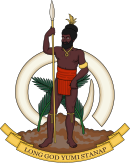 |
|---|
Elections to the Chamber of Commerce, Industry and Agriculture were held in the New Hebrides in 1963. They were the first elections in the territory's history.
 |
|---|
Elections to the Chamber of Commerce, Industry and Agriculture were held in the New Hebrides in 1963. They were the first elections in the territory's history.
An Advisory Council was set up in 1958, with all members appointed. A 20-member Chamber of Commerce, Industry and Agriculture was subsequently created in 1963, with 12 members appointed by the British and French Resident Commissioners (eight from the indigenous population and four Europeans) and eight elected European members, four from the agriculture sector and four from the commerce and industry sector. [1] The right to vote was limited to people with a trading licence, and only around 230 people – mostly Europeans – were eligible to vote. [2]
| Type | Member |
|---|---|
| Elected Europeans (agriculture) | Gabriel des Granges |
| J. Ratard | |
| H. Russet | |
| K. Solway | |
| Elected Europeans (commerce and industry) | J. Chauveau |
| L. Leca | |
| G. Meyer | |
| J. Stegler | |
| Appointed Europeans (agriculture) | P. Lutgen |
| G. Seagoe | |
| Appointed Europeans (commerce and industry) | D.J. Gubbay |
| J. Villemont | |
| Appointed indigenous | Ati |
| André Carlot | |
| Frank | |
| Garae | |
| John Kalsakau | |
| Jean-Marie Léyé | |
| Tom Tipoloamata | |
| To | |
| Source: Pacific Islands Monthly | |
The Chamber met for the first time in Port Vila on 14 June, with both Resident Commissioners making speeches. [1]
In 1964 the Advisory Council was reconstituted to include four members elected by the Chamber of Commerce, Industry and Agriculture (two British and two French) and four elected by the four district councils. Guichard, Leca (French), Seagoe and Solway (British) were elected by the Chamber, whilst John Kalsakau (Central 1), Joseph d'Uripiv (Central 2), Michael Ala (Northern) and Jean-Marie Léyé (Southern) were elected by the district councils. [3]
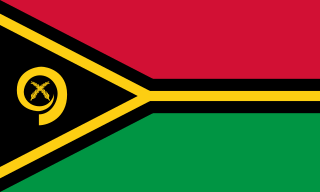
Vanuatu, officially the Republic of Vanuatu, is an island country in Melanesia, located in the South Pacific Ocean. The archipelago, which is of volcanic origin, is 1,750 km (1,090 mi) east of northern Australia, 540 km (340 mi) northeast of New Caledonia, east of New Guinea, southeast of Solomon Islands, and west of Fiji.

The Election Committee is the electoral college in Hong Kong that selects the Chief Executive (CE) and, since 2021, elects 40 of the 90 members of the Legislative Council. Established by Annex I of the Basic Law of Hong Kong which states that "the Chief Executive shall be elected by a broadly representative Election Committee in accordance with this Law and appointed by the Central People's Government ." It is formed and performs its selection function once every five years, even in the event of a CE not completing their term. The membership of the Election Committee was expanded to 1,500 under the massive overhaul of the electoral system in 2021. The Election Committee has been criticised for its "small-circle" electoral basis and its composition favouring pro-Beijing and business interests.

The president of Vanuatu is the head of state of Vanuatu. The president is elected for a five-year term by an electoral college consisting of Parliament and the presidents of the regional councils.

Pierre René Hubert Marie van der Linden is a retired Dutch politician and diplomat of the Catholic People's Party (KVP) and later the Christian Democratic Appeal (CDA) party and economist.
Andrew Indar Narayan Deoki was an Indo-Fijian statesman who served his community as a social and religious leader, soccer administrator, member of the Legislative Council and Senate in independent Fiji and as Attorney General.
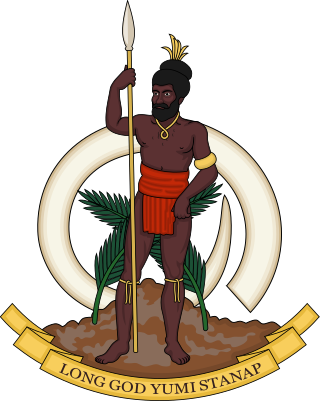
General elections were held for the first time in the New Hebrides on 10 November 1975. The result was a victory for the New Hebrides National Party, which won 17 seats in the new Representative Assembly.

Early general elections were held in the New Hebrides on 29 November 1977 following the dissolution of the Representative Assembly elected in 1975 due to the Vanua'aku Pati blocking its work in order to protest the inclusion of members elected by the Chamber of Commerce.

Elections to the Legislative Council were held in Burma on 17 November 1925. Under the terms of the dyarchy constitution, the Legislative Council of Burma was advisory to the British colonial governor, and had some direct authority over education, local government, public health, agriculture and forests. The Nationalist Party received the most votes, but was unable to form a government as the British authorities favoured the Independent Party, who formed a government led by Joseph Augustus Maung Gyi.

General elections were held in the Solomon Islands for the first time on 7 April 1965.

General elections were held in Papua and New Guinea for the first time on 10 November 1951.

General elections were held in the Cook Islands in March 1956. The elections took the form of an election to Rarotonga Island Council, whose sole European member also automatically became the only elected member of the Legislative Council. Incumbent member Henley McKegg was narrowly re-elected, defeating R.J.A. Ingram by three votes.

General elections were held in the Cook Islands in 1953. The elections took the form of an election to Rarotonga Island Council, whose sole European member also automatically became the only elected member of the Legislative Council.

General elections were held in the Cook Islands in May 1961.

General elections were held in the Territory of Papua and New Guinea between 15 February and 15 March 1964. They were the first elections in the territory held under universal suffrage. Voter turnout among enrolled voters was 65%.

General elections were held in the New Hebrides in July and August 1969 to elect fourteen members of the thirty members of the Advisory Council.
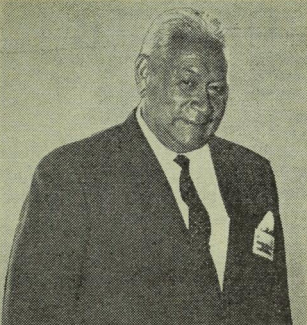
Afioga Afoafouvale Misimoa, also known by his European name Harry William Moors, was a Western Samoan businessman and politician. He served as a member of the Legislative Assembly in two spells between 1951 and 1967, and was the first Pacific Islander to become Secretary-General of the South Pacific Commission. He also founded the Samoa Rugby Union.

Legislative Council elections were held in the Cook Islands in 1947, the first after the establishment of the new legislature.

Douglas Walkden-Brown was an Australian Fijian missionary, farmer, educator, politician and diplomat. He was a member of the House of Representatives from 1966 to 1977 and served as Minister for Natural Resources and Minister for Agriculture, Fisheries and Forests between 1967 and 1975, later becoming Fijian Consul in Sydney.
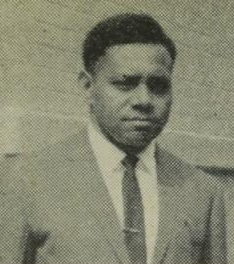
Michael Ala was a Vanuatuan medical practitioner, clergyman and politician. He served as a member of the Advisory Council from 1964 to 1975.

The New Hebrides Representative Assembly was a unicameral legislature in New Hebrides Condominium from 1975 to 1980. It was the first elected legislative arm in the condominium.